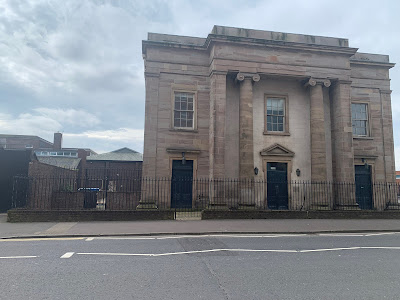 |
| College Square ca 1835 (historic OS map) |
COLLEGE SQUARE, an area of wasteland near central Belfast in 1806, was laid out under the auspices of the town's landlord, the Marquess of Donegall.
The surrounding fields were once utilized as grazing pasture for cattle; indeed prior to building work a watchman was "empowered to impound all cattle found trespassing on the Institution grounds.”
RBAI, the original and oldest building at College Square, was intended to form the nucleus of a town square, with terraced houses to the north, south, east, and west; this vision was spoiled, however, by the erection of the College of Technology inside the square at the corners of College Square East and College Square North.
This handsome cuckoo in the nest was completed about 1907 in the Baroque Revival style.
COLLEGE SQUARE EAST, running from 38 College Street to Fisherwick Place, faces Belfast city centre, with a vista along Wellington Place towards City Hall.
A statue of the Rev Henry Cooke, erected in 1876, is situated outside the gates of RBAI.
COLLEGE SQUARE SOUTH was intended to run from the present Murray Street to Durham Street; the ground at Murray Street, however, was leased to Sir James Murray in 1825, and became a short cul-de-sac instead.
COLLEGE SQUARE NORTH runs from 1, College Square East, to Durham Street.
This terrace, which includes Wilton House and the Old Museum, was built about 1830.
It would have run from Christ Church (erected in 1833) to a spot some yards to the north of the present Athol Street.
 |
| Royal Belfast Academical Institution post-1831 (artist unknown) |
The surrounding fields were once utilized as grazing pasture for cattle; indeed prior to building work a watchman was "empowered to impound all cattle found trespassing on the Institution grounds.”
 |
| Click to Enlarge (Timothy Ferres) |
The campus of Royal Belfast Academical Institution (RBAI), often known simply as "Inst," comprised eight acres.
 |
| Royal Belfast Academical Institution (Timothy Ferres, 2023) |
RBAI, the original and oldest building at College Square, was intended to form the nucleus of a town square, with terraced houses to the north, south, east, and west; this vision was spoiled, however, by the erection of the College of Technology inside the square at the corners of College Square East and College Square North.
 |
| RBAI, 1833 (Dublin Penny Journal: Views in Belfast) |
This handsome cuckoo in the nest was completed about 1907 in the Baroque Revival style.
 |
| 11-15 College Square East (Timothy Ferres, 2023) |
COLLEGE SQUARE EAST, running from 38 College Street to Fisherwick Place, faces Belfast city centre, with a vista along Wellington Place towards City Hall.
 |
| College Square East ca 1920 (W A Green/ NMNI) |
A statue of the Rev Henry Cooke, erected in 1876, is situated outside the gates of RBAI.
The first statue on this site was of Frederick Richard, Earl of Belfast (1827-53), now located inside City Hall.
The oldest block still standing at College Square East is a terrace of four-storey houses, now shops and offices, at the corner of the square and Wellington Place, built about 1830.
Six surgeons resided at 11-15 College Square East in 1890.
William Thomson, elevated to the peerage in 1892 as Baron Kelvin, was born at 17 College Square East in 1824.
 |
| Murray Street (Timothy Ferres, 2023) |
COLLEGE SQUARE SOUTH was intended to run from the present Murray Street to Durham Street; the ground at Murray Street, however, was leased to Sir James Murray in 1825, and became a short cul-de-sac instead.
It was once known as Murray's Terrace.
 |
| College Square North (Timothy Ferres, 2023) |
COLLEGE SQUARE NORTH runs from 1, College Square East, to Durham Street.
This side of the square suffered greatly during the "Troubles" in the 1970s, with frequent bombing.
Part of the original terrace, nevertheless, survives, from numbers 5-12.
 |
| Wilton House (Timothy Ferres, 2023) |
This terrace, which includes Wilton House and the Old Museum, was built about 1830.
COLLEGE SQUARE WEST, like its southern neighbour, never materialized.
 |
| Christ Church, 40 College Square North (Timothy Ferres, 2023) |
It would have run from Christ Church (erected in 1833) to a spot some yards to the north of the present Athol Street.
IT being found that a church was much wanted for the poorer classes of Protestants, the present edifice was erected. The sum of £2,000 was granted by the Board of First Fruits; and £3,000 were raised by subscription to complete it.
It is a plain edifice, with a cut-stone front and colonnade of the Ionic order, surmounted with an entablature; the other parts are of brick, with windows in recesses, ornamented with circular architraves.
The interior is laid out to give as much accommodation as possible: there are seats for one thousand persons on the ground floor; and there is a handsome gallery, which holds upwards of six hundred persons - it has been lately inclosed with an ornamental iron railing. It was opened in July, 1833.
Near the church a most commodious schoolhouse has been erected, which was also completed out of the liberal subscriptions of the inhabitants.
£5,000 in 1833 was equivalent to about £476,000 in 2021.
Christ Church held its last service for worshippers in 1993.



1 comment :
These are all such fine looking buildings which have stood the test of time. I wonder what future generations will make of the buildings of today. I see the expected life of a new build house is about 60 years. Woeful.
Post a Comment